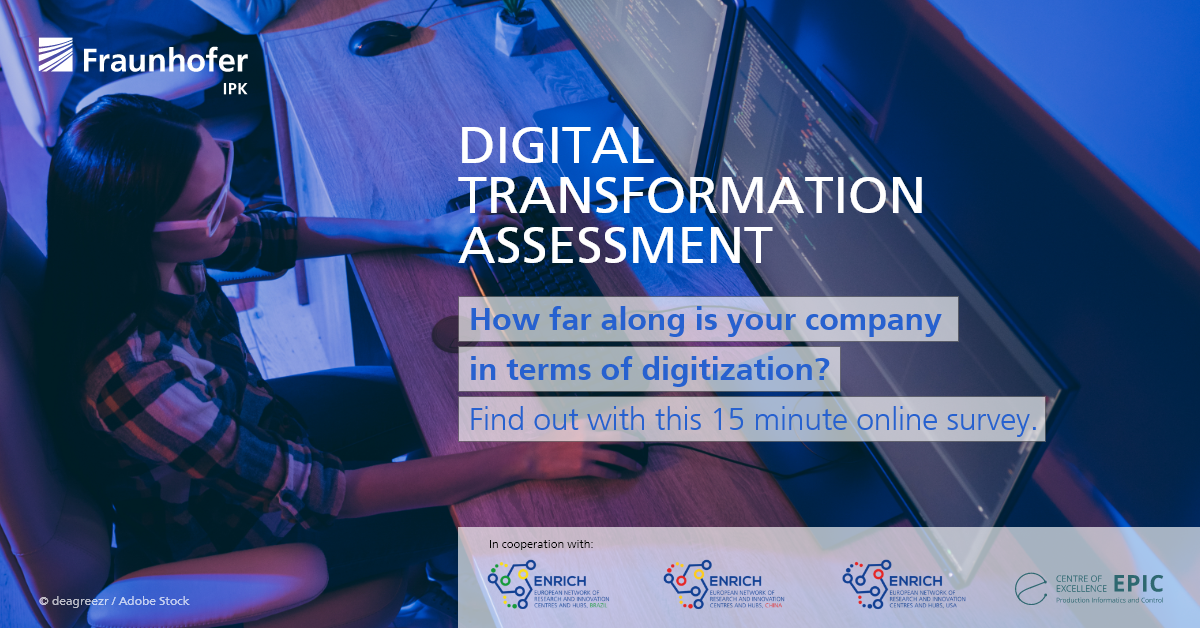By Florian Kidschun
Digitalization has extensive effects on the value-creating organizations of all sectors. New business models and processes are becoming established, the development of products and services is changing as well as the interaction with customers, partners, and suppliers. As these changes create new requirements for organizations, they need to reorient and adapt to them, for which they need to know their position in this highly volatile environment.
Digitization and the subsequent digital transformation process, which are driven by the use of new information and communication technologies, not only present immense opportunities for people to actively design their own futures but also present significant problems for businesses. Organizational environments are not just evolving more quickly, but they are also become more unpredictable, uncertain, and complex. It is more crucial than ever for organizations to be able to respond and adapt to their environment in order to remain competitive in the long run given the quick changes in competition, demand, technology, and regulations.
Digital Transformation Assessment Tool
Understanding the digital transformation status quo and having a benchmark is essential for organizations adopting digital transformation strategies. A holistic reference model to assess the digital transformation process of companies is developed by Fraunhofer IPK in Berlin. Both extensive literature review and expert discussions are carried out. A self-assessment tool was created which is able to define the current state of organizations in digital transformation and action fields to implement digital transformation strategies. Thanks to broad support in the implementation by organizations and initiatives like ENRICH in LAC, China, and the USA as well as EPIC, the study aims to capture the status quo of digital transformation in an international context.
A structural framework was required to understand and embody an organization in digital transformation. The tool utilizes seven assessment dimensions and 33 assessment items that embody an organization in digital transformation. After model analysis, workshop series, and considering further challenges and drivers of digital transformation, the seven dimensions of digital transformation are defined as corporate strategy, leadership & corporate culture, organization & processes, employees & competences, technology, products & services, and supply chain & networks.

Results of the global status
On a period of 2 years and 5 months (29 months), from June 2020 the end of October 2022, more than 440 answers from a total of 55 countries and 20 different industry sections were received. The great majority of 34% of participants originate from the manufacturing sector, 13% came from the information and communication sector, and 10% from the education sector. The results show that the survey is representative of all sizes of companies, as both large companies and SMEs are covered – the great majority, about 55%, being SMEs (<250 employees).
While more than half of the companies have digitalization as a major component of corporate strategy, defined measurable goals are absent in about 15% of the companies. Another major impediment is the inadequate monitoring of activities to reach company targets in digital transformation.
When analysing the importance of leadership & corporate culture, more than 60% of the companies reported that their top management is actively driving the digital transformation forward.
More than 40% stated that their operational employees have a positive attitude towards digital transformation. A weak point has been found in the way activities for the digital transformation are communicated to the employees, where about 30% wish for a more target-oriented manner. By deep-diving into the key area of organization & processes, it was analysed that 40% agree that their company has already recognized the benefits of new forms of work and organization made possible by digital technologies.
In the field of employees & competences, it was deducted that most companies use digital solutions not systematically for HR management tasks. More than 40% of the companies do not regularly evaluate their employees’ digital competencies. 40% of the companies state that the personal skills of their employees are sufficiently developed to successfully master the challenges of digitalization, along with 38% who assess that their companies are already undergoing this process. In addition, 40% assess the social-communicative skills of their employees in the digital work environment as adequate to master the challenges of digitalization.
In the scope of the technological dimension, it was found that half of the companies have defined and implemented necessary standards and regulations for IT security. Nearly 50% of the companies make extensive use of digital technologies to improve cross-functional cooperation and knowledge transfer within their organization. High uncertainty was reported regarding the maturity of the systems to collect, consolidate, aggregate, and evaluate data in real-time with only 39% of the companies stating a high maturity of their IT and data architecture.
Almost half of the companies monitor external market and technology developments systematically and continuously to identify new approaches for the further development of their business model. Nearly 40% see potential in the analysis and utilization of digitally collected usage data for the continuous development of their products and services. In addition, 35% strongly involve external stakeholders in the development of digital products and services. However, only 36% of the companies strongly supplement their products and services with additional digital offerings.
A share of 44% makes extensive use of digital software solutions and 39% makes extensive use of digital channels & interfaces for customer management. Approximately one-third of the companies practice regular exchanges with external experts and partners to gain knowledge on digitalization trends.

Are you interested in participating in the digital transformation assessment survey?
The digital transformation assessment survey can be completed in 15 minutes furthermore your organization will receive a company-specific online evaluation. The results help understand the stand of your organization in the digital journey. This supports identifying the main topics that are of particular importance for the digital viability of your company.
For more information and to participate in the survey click here
